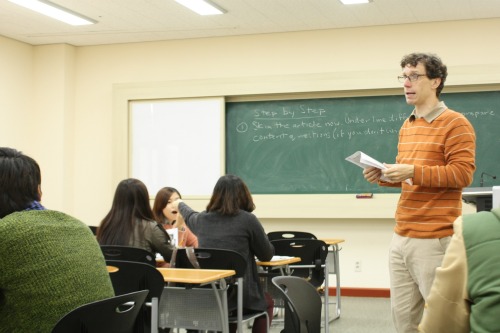영어전용강의, 과연 효과적인가?
<#322 News Focus>
Do We Need EMI Courses?
By Pyun Ja-seong, Student Editor
This article is the part 1 of series to evaluate the efficiency of English as the medium of instruction for subject courses at CNU. It focuses on the reactions from domestic students, and Part 2 will report the opinions of international students in the next issue of Chonnam Tribune – Ed.
English is considered as the common language of the world, most Korean universities, including Chonnam National University (CNU), are trying to implement English as the medium of instruction (EMI) for subject courses and encourage their students to take the courses, these are the so called ‘EMI courses’. What is an EMI course and are there any advantages by taking classes in English?

The Goal of EMI Courses at CNU
CNU has offered EMI courses for various majors and liberal arts since 2004. The courses are operated in two different formats: class type A is that professors and students use only English during the class, and class type B is that both English and Korean can be used and in the class professors explain contents in English and then summarize them in Korean. Therefore, a student who wants to take class type A needs to be proficient in using English. The main goal of this EMI course is to improve CNU students’ English abilities and to foster more global intellectuals who will be the future leaders of Korea in the internationalized world. Professor Kuk Min-ho (Dept. of Sociology) said, “Many CNU students have received low marks in English proficiency tests such as TOEFL and TOEIC. That is the reason why EMI courses were made at CNU.” The university administrators expected that the more that students are exposed to English through the EMI courses, the better their English ability will become. Under such a university policy for boosting EMI courses, the EMI classes are planned to be continuously increased, and the number of the classes for undergraduate students has increased from 95 to 460 in last four years.
Pros and Cons of EMI Courses
There are pros and cons on the effectiveness of EMI courses. Students can obtain more accurate information and correctly understand scientific terms and theories which are from other foreign countries and are difficult to be interpreted in Korean. With these advantages, students can improve their level of understanding of their majors and their English ability by using English during class. Choi Da-ye (Sophomore, Dept. of Molecular Biology) said that she could get used to using some unfamiliar English words while taking major studies through EMI classes.
However, most EMI courses are open for specific major subjects (460 out of 496 EMI courses in 2011) and only a small portion for liberal arts and free electives. This has prevented students who have minimal English abilities from taking the EMI courses because many students thought that studying major classes in English would be more difficult. Jung Da-un (Freshman, Dept. of English Lang. & Lit.,) said that EMI classes for major courses are focused on improving one’s English ability and that they are a little bit difficult to study. “EMI classes for liberal arts are more focused on cultural knowledge, so we do not feel a burden to take the classes in English”, he added.
Different Levels of EMI Courses Are Needed
To improve the positive effects of EMI classes for students, above anything else, EMI classes in the liberal arts should increase. Most students are not familiar with taking a class in English so it would be good for students to take easy liberal arts classes offered in English first. Also, both professors and students know that now is not the right time to study intensive major studies in English. It is never too late to open EMI classes for major studies after familiarizing many students with classes given in English. One professor from Deonaga (a studying community of professors at CNU) program said, “Students are not accustomed to taking classes in English so I try to encourage their participation during the class by having class presentations and discussions.”
As for professors, they should figure out students’ level of English proficiency or set up their lectures based on students’ ability such as test scores from TOEIC or TOEFL. If necessary, students can be divided into classes based on their level. It will improve students’ understanding of content in English to assign students to different classes which cater to their needs.
In the case of students, they need to study hard. Taking any course in a foreign language requires thorough preparation and paying attention in the lecture. Even studying our own major in our mother tongue is difficult. Therefore, before taking a class, read materials and look up the words you do not understand in context. It will improve your understanding and concentration level in the class. Also, students need to be active during class. If one cannot understand what a lecturer is saying, a mindset of asking questions will be the key for understanding.
편자성 기자
jspyun@outlook.com

